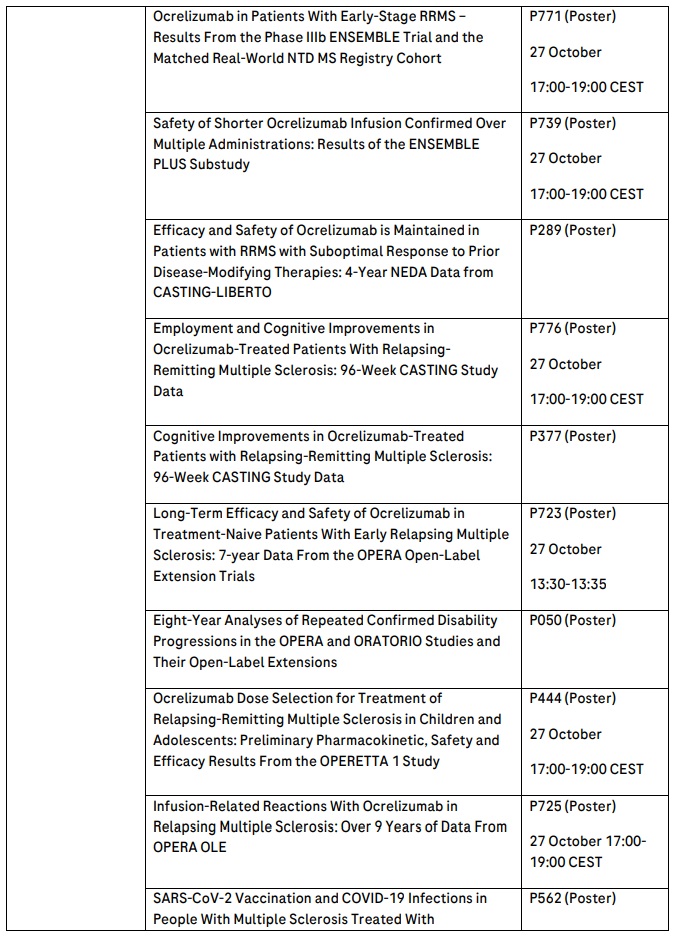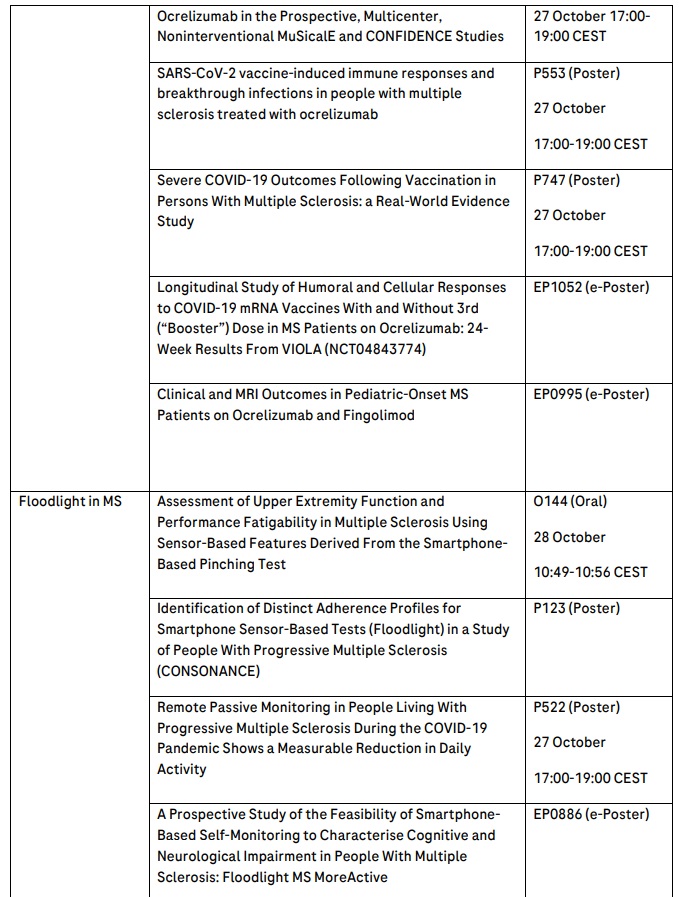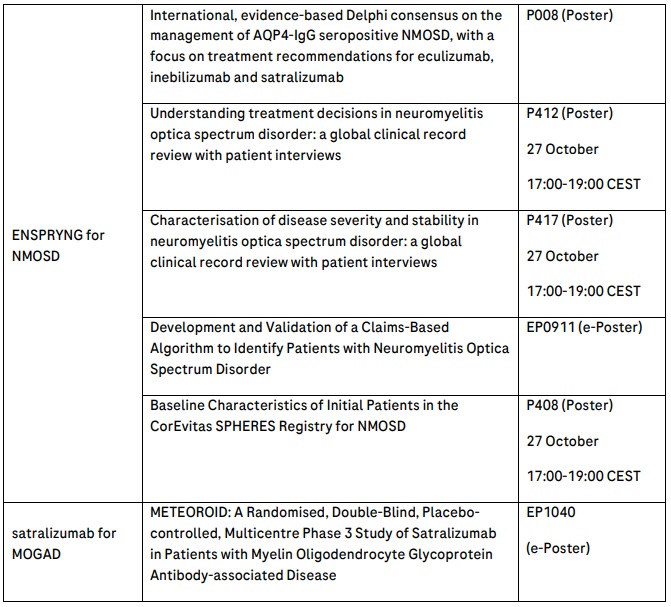
OCREVUS data will show significant benefit on slowing disease activity and progression in patients with treatment-naive early-stage relapsing-remitting multiple sclerosis (RRMS)
Largest pregnancy safety data across anti-CD20 medicines for OCREVUS in multiple sclerosis (MS)
Nine-year safety data for OCREVUS reinforces its favourable benefit-risk profile
New research demonstrates impact of misdiagnosis and delay of starting treatment in NMOSD
Basel, 19 October 2022 - Roche (SIX: RO, ROG; OTCQX: RHHBY) today announced that new OCREVUS® (ocrelizumab) data and continued research into neuromyelitis optica spectrum disorder (NMOSD) will be presented at the 38th Congress of the European Committee for Treatment and Research in Multiple Sclerosis (ECTRIMS) from 26-28 October 2022. These data include 35 abstracts, highlighting disease activity and progression results in early-stage RRMS, pregnancy outcomes from more than 2,000 women with MS and long-term safety data for OCREVUS, as well as global NMOSD data exploring impact of delayed treatment, clinical characterization of disease severity and stability, and accurate identification of people living with NMOSD through healthcare claims-based algorithms. Finally, the design of a Phase III study evaluating the efficacy and safety of satralizumab in Myelin Oligodendrocyte Glycoprotein Antibody-associated Disease (MOGAD), a rare, chronic and debilitating autoimmune disease primarily affecting the optic nerve, brain and spinal cord, will be presented.
“Our aim is to enable people living with MS and NMOSD to maintain life to the fullest. With over 250,000 people treated with OCREVUS, we continue to see significant reductions in MS disease progression balanced with favourable safety,” said Levi Garraway, M.D., Ph.D., Roche’s Chief Medical Officer and Head of Global Product Development. “We are also focused on remaining unmet needs – such as earlier diagnosis and treatment – which is critical to ensure patients are receiving the most appropriate treatment.”
Multiple sclerosis (MS)
Roche will present 29 MS abstracts, including data from a two-year interim analysis of treatment-naive, early-stage patients with RRMS from the open label Phase IIIb ENSEMBLE study that will show the positive impact on disease activity and progression when newly diagnosed patients are treated with OCREVUS, and outcomes from the largest cumulative pregnancy dataset for an anti-CD20 MS medicine in more than 2,000 women treated with OCREVUS. Long-term data from all OCREVUS clinical trials in relapsing MS (RMS) and primary progressive MS (PPMS) over nine years will reinforce the consistently favourable benefit-risk profile of OCREVUS.
Neuromyelitis optica spectrum disorder (NMOSD)
Roche will present five NMOSD abstracts, including the development and testing of a healthcare claims-based algorithm to identify people living with NMOSD. Misdiagnosis of NMOSD is common and associated with a delay in initiating maintenance therapy. This was highlighted in a study looking to develop a clearer understanding of patient characteristics, relapse severity and other drivers of treatment choice.
The development of validated consensus statements on AQP4-IgG seropositive NMOSD management will also be presented with a focus on treatment recommendations including satralizumab; these statements aim to optimise patient outcomes through informed treatment decision making. The characterisation of disease severity and stability in NMOSD will also be presented, with the aim of integrating these in worldwide NMOSD clinical practice.
Roche will also present the study design from a Phase III study that will evaluate the efficacy and safety of satralizumab in MOGAD.
Follow Roche on Twitter via @Roche and keep up to date with ECTRIMS 2022 news and updates by using the hashtag #ECTRIMS2022.





About OCREVUS (ocrelizumab)
OCREVUS is the first and only therapy approved for both RMS (including RRMS and active, or relapsing, secondary progressive MS [SPMS], in addition to clinically isolated syndrome [CIS] in the U.S.) and PPMS. OCREVUS is a humanised monoclonal antibody designed to target CD20-positive B cells, a specific type of immune cell thought to be a key contributor to myelin (nerve cell insulation and support) and axonal (nerve cell) damage. This nerve cell damage can lead to disability in people with MS. Based on preclinical studies, OCREVUS binds to CD20 cell surface proteins expressed on certain B cells, but not on stem cells or plasma cells, suggesting that important functions of the immune system may be preserved. OCREVUS is administered by intravenous infusion every six months. The initial dose is given as two 300 mg infusions given two weeks apart. Subsequent doses are given as single 600 mg infusions.
About ENSPRYNG (satralizumab)
ENSPRYNG, which was designed by Chugai, a member of the Roche Group, is a humanised monoclonal antibody that targets interleukin-6 (IL-6) receptor activity. ENSPRYNG was designed using novel recycling antibody technology which, compared to conventional technology, allows for longer duration of the antibody and subcutaneous dosing every four weeks.
Positive Phase III results for ENSPRYNG, as both monotherapy and in combination with baseline immunosuppressive therapy, demonstrate that IL-6 inhibition is an effective therapeutic approach for neuromyelitis optica spectrum disorder (NMOSD). ENSPRYNG is currently approved for NMOSD in 72 countries with further applications under review with numerous regulators. Roche continues to investigate ENSPRYNG in further indications including generalised myasthenia gravis (gMG), Myelin Oligodendrocyte Glycoprotein Antibody-associated Disease (MOGAD) and Autoimmune Encephalitis (AIE).
ENSPRYNG was granted Breakthrough Therapy Designation for the treatment of NMOSD by the FDA in December 2018 and designated as an orphan drug for NMOSD in the United States, Europe, Russia and Japan.
In addition, it has been designated as an orphan drug for gMG, MOGAD and AIE (NMDAR).
About Roche in neuroscience
Neuroscience is a major focus of research and development at Roche. Our goal is to pursue ground-breaking science to develop new treatments that help improve the lives of people with chronic and potentially devastating diseases.
Roche has both approved and investigational medicines across multiple sclerosis, spinal muscular atrophy, neuromyelitis optica spectrum disorder, myasthenia gravis, Alzheimer’s disease, Huntington’s disease, Parkinson’s disease and Duchenne muscular dystrophy. Together with our partners, we are committed to pushing the boundaries of scientific understanding to solve some of the most difficult challenges in neuroscience today.
About Roche
Roche is a global pioneer in pharmaceuticals and diagnostics focused on advancing science to improve people’s lives. The combined strengths of pharmaceuticals and diagnostics under one roof have made Roche the leader in personalised healthcare – a strategy that aims to fit the right treatment to each patient in the best way possible.
Roche is the world’s largest biotech company, with truly differentiated medicines in oncology, immunology, infectious diseases, ophthalmology and diseases of the central nervous system. Roche is also the world leader in in vitro diagnostics and tissue-based cancer diagnostics, and a frontrunner in diabetes management.
Founded in 1896, Roche continues to search for better ways to prevent, diagnose and treat diseases and make a sustainable contribution to society. The company also aims to improve patient access to medical innovations by working with all relevant stakeholders. More than thirty medicines developed by Roche are included in the World Health Organization Model Lists of Essential Medicines, among them life-saving antibiotics, antimalarials and cancer medicines. Moreover, for the twelfth consecutive year, Roche has been recognised as one of the most sustainable companies in the Pharmaceuticals Industry by the Dow Jones Sustainability Indices (DJSI).
The Roche Group, headquartered in Basel, Switzerland, is active in over 100 countries and in 2020 employed more than 100,000 people worldwide. In 2020, Roche invested CHF 12.2 billion in R&D and posted sales of CHF 58.3 billion. Genentech, in the United States, is a wholly owned member of the Roche Group. Roche is the majority shareholder in Chugai Pharmaceutical, Japan